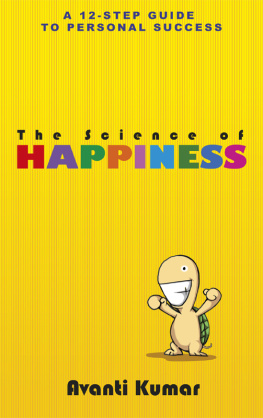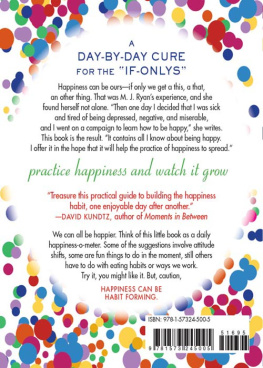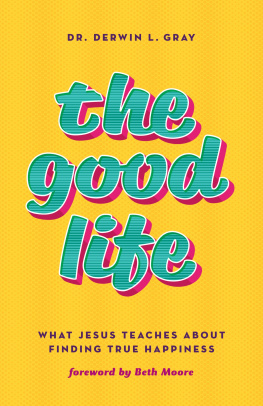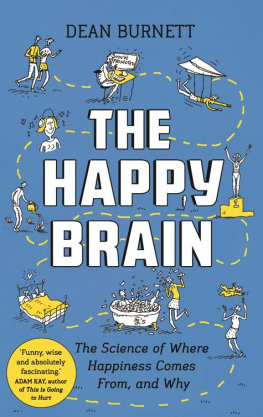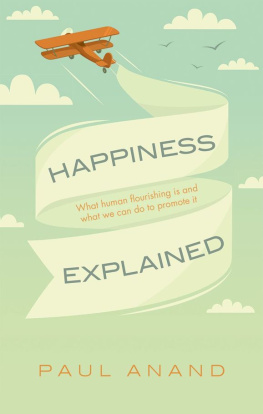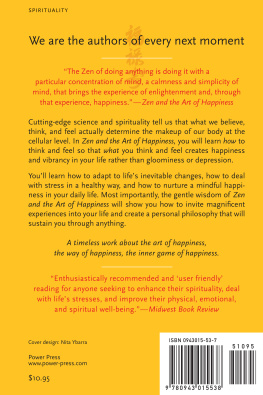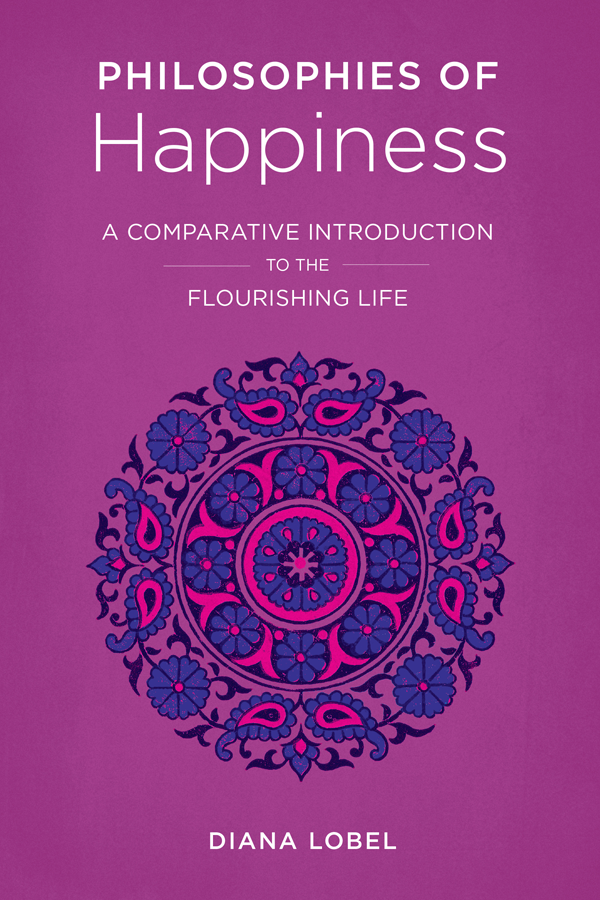Contents
Guide
Pagebreaks of the print version
Philosophies of Happiness
PHILOSOPHIES of HAPPINESS
A Comparative Introduction to the Flourishing Life
DIANA LOBEL

COLUMBIA UNIVERSITY PRESS NEW YORK
Columbia University Press
Publishers Since 1893
New York Chichester, West Sussex
cup.columbia.edu
Copyright 2017 Columbia University Press
All rights reserved
E-ISBN 978-0-231-54532-7
Library of Congress Cataloging-in-Publication Data
Names: Lobel, Diana, author.
Title: Philosophies of happiness : a comparative introduction to the flourishing life / Diana Lobel.
Description: New York: Columbia University Press, [2017] | Includes bibliographical references and index.
Identifiers: LCCN 2017011392 | ISBN 9780231184106 (cloth: alk. paper) | ISBN 9780231184113 (pbk.: alk. paper)
Subjects: LCSH: Happiness. | HappinessReligious aspects.
Classification: LCC B105.H36 L63 2017 | DDC 128dc23
LC record available at https://lccn.loc.gov/2017011392
A Columbia University Press E-book.
CUP would be pleased to hear about your reading experience with this e-book at .
Cover design: Jordan Wannemacher
For Pippa,
a fountain of joy who brings
happiness to all.

Contents
I would like to thank all those who have made this book possible, many of whom are named Brian or David: Brian Anderson, for his kind and generous technical assistance, far beyond the call of duty; Brian Jenkin, for his dedicated assistance on all levelstechnical, scholarly, and collegial; Brian Loh, for countless hours of insightful reading and discussion of texts; Brian Marrin, for expert guidance in reading Greek texts; Bryan Turcotte, for generous editorial assistance; Brian Zitin (and Adam Hoffmann), for their sincere and dedicated existential quest; David Jennings, for his patient and stimulating guidance in reading Greek texts; David Konstan, for his rich discussion and comments on Epicurus; David Roochnik, for illuminating reading and discussion of Aristotle in Greek; David Wolfsdorf, for extremely generous and stimulating exchanges on Aristotle, Epicurus, theories of pleasure, and philosophy of mind; David Eckel for his warm collegiality; and David Frankfurter for his generous support as Chair of the Religion Department. I am also grateful to Wendy Czik, Jonathan Klawans, Deeana Klepper, Karen Nardella, and Stephen Prothero for their deep and kind support over the years.
I thank Ian Cooley for his expert editing of several chapters and Colby Philips for editorial suggestions and our engaging and far-reaching exploration of texts. I am indebted to colleagues and students who generously read, discussed, and commented on chapters of the book, including Deborah Achtenburg, Madeline Aruffo, Robert Eno, Alan Fox, Anna Geary-Meyer, Sean Hannan, Steven Harvey, Warren Zev Harvey, Philip J. Ivanhoe, Raphael Jospe, Menachem Kellner, Amod Lele, James W. Morris, Shohaku Okumura, Bernard Septimus, Sassan Tabatabai, and Ithamar Theodor. I am also grateful for e-mail conversations with Julia Annas, John D. Dunne, Taigen Dan Leighton, Kaz Tanahashi, as well as Elizabeth Asmis, who shared a pre-published paper. I am particularly grateful to P. J. Ivanhoe for his generous guidance and interest in my work and to Robert Eno for his detailed comments and suggestions. I thank Wendy Lochner of Columbia University Press for her warm and enthusiastic support for the project and Susan Pensak for her adroit and sensitive editorial work. I would also like to thank Boston Universitys Center for the Humanities and College of Arts and Sciences, which provided subvention funds for the books publication; Stephen Prothero, who generously located funds for indexing and facilitated the publication process in many ways; and Johnathan Kelly, who indexed the book.
I am deeply appreciative of the communities of study and prayer that have so enriched my life, including the winter community that has provided the conditions for flourishing that made this book possible. I am grateful to Stan Dorn for our rich learning together over the years; Miriam Bronstein, Sandra Daitch, Dennis Friedler, Mirja Holmboe, Axel Knauf, Beth OSullivan, Catherine Tutter, and our study group for friendship and love for learning. I appreciate Walter Ness and Barbara Brandt for their friendship and all I have learned in their presence; Tom Alden, for his wisdom, understanding, and compassion; Debi Adams and Adam Bailey, who have generously shared the gift of the Alexander Technique and the beauty of integration; and Tina Mulhern for more than my heart can ever say.
My indefatigable assistants Rey Maguad, Alisa Granada, Taylor Kwok, Khea Chang, Karissa Ly, Ivy Zhang, and Diane McLaughlin saw this book from its acceptance through editing and production. Alisa Granada and Taylor Kwok miraculously produced the bibliography. May their kindness, generosity, and devotion ever be rewarded.
I dedicate this book to my family, Albert, Francine z l, and Janet Lobel, and my extended family, including John Paul, Katrina, and Pippa. May they always enjoy the happiness they so warmly give and richly deserve.
Eudaimonia as Human Flourishing
What is happiness? What is it to live a balanced, healthy, and fulfilling life? The topic of this book is happiness in the sense described by early Greek philosophers eudaimonia , or what it is to flourish as a human being. Just as a plant can take in the sun and flourish, so a human being can thrive and realize his or her purpose in life. This need not be a purely individual or self-centered pursuit. The supreme vow one takes in the Mahyna Buddhist tradition is to relieve the suffering of all beings. Likewise when we strive for social justice or work to assuage the suffering of the poor, our goal is to offer others the chance for a happy life. We will see that the flourishing life in its broadest sense aims to realize the purpose of human living by contributing to something larger than oneself.
Nevertheless, many of us today associate happiness with a feelingwhether something immediate, like joy or pleasure, or something more long lasting, such as contentment or satisfaction with our lives. One contemporary theorist, Daniel Nettle, identifies three levels of happiness.
A third level of happiness is the life of eudaimonia , the good life, in which one flourishes and realizes ones potential. This is an objective rather than a subjective assessment. A person who is happy in this sense is thriving. The child in kindergarten is playing creatively, stretching his or her abilities, making friends and growing; an adult is involved in creative projects in his or her work, family, and community. The life of eudaimonia will usually include moments of pleasure and joy and a sense of satisfaction that one is living life as one should. It is thus inclusive, comprising both an objective assessment and a sense of subjective joy and satisfaction.
Now Nettle himselfalong with philosopher Daniel Haybronobjects that the literature of philosophy and psychology has conflated two distinct senses of happiness. They argue that when we say, in common conversation, I am happy, we are describing a psychological condition, whether an immediate sense of pleasure or joy (level 1 happiness) or an assessment of satisfaction with our life as a whole (level 2 happiness). In contrast, these theorists suggest, when an ancient philosopher such as Aristotle speaks of eudaimonia, he is not describing a psychological condition but is rather making a normative, evaluative claim of what is the best life for a person. In response to this objection, I will show that in his theory of pleasure Aristotle in fact brings together psychological and normative dimensions of happiness. Pleasure for Aristotle is the appreciation and enjoyment of our valuable activities. When we engage in activities that actualize our potential, we experience the greatest degree of fulfillment. For eudaimonists such as Aristotle, the life of valuable activity is the most intrinsically rewarding and fulfilling life. Happiness is indeed the activity of flourishing as a human being; pleasure is the psychological dimension of human flourishing.


